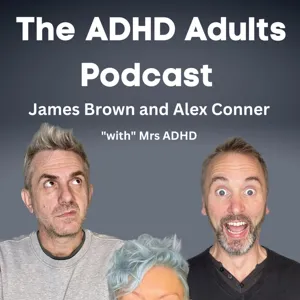Podcast Summary
Relatable conversations for those dealing with ADHD: The 'ADHD Alice' podcast offers comfort, connection, and understanding for those dealing with ADHD through raw and honest conversations, reaching a wide audience and making a significant impact on their lives.
The podcast "ADHD Alice" not only provides entertainment but also offers comfort and connection for those dealing with ADHD. The hosts, James Brown and Dr. Alex Connor, share their experiences and struggles, creating a relatable space for listeners. The podcast has reached a wide audience, with listeners from over 100 countries, and has made a significant impact on those going through their own diagnosis journey. The raw and honest conversations help remind listeners that they're not alone and that it's okay to have ADHD. The engagement from listeners, through letters and comments, shows the importance and value of the podcast in their lives.
Imposter Syndrome: A Serious Issue Affecting Many: Imposter syndrome can lead to self-doubt, overcompensation, and hinder personal growth despite being inaccurate feelings of not deserving success
Imposter syndrome, despite being a colloquial term, is a serious issue affecting many individuals, both those with and without ADHD. It's the persistent feeling of not deserving success or being a fraud, leading to self-doubt and overcompensation. According to research, the prevalence of imposter syndrome can range from 8% to over 80%. This feeling of not being good enough is often inaccurate and can lead to dangerous consequences such as working excessively and feeling undeserving of one's position or relationships. It's important to remember that these feelings are not a reflection of reality and can hinder personal growth and well-being.
Imposter syndrome and ADHD: Individuals with ADHD often experience imposter syndrome due to various causes including childhood criticism, underutilized intelligence, neuroticism, anxiety/depression, and bias. Self-awareness, internal dialogue, and believing in abilities can help manage it.
Imposter syndrome, a feeling of inadequacy despite evidence of competence, is a common experience, especially for individuals with ADHD. The causes of imposter syndrome are not clear, but it's believed to be linked to factors such as childhood criticism, natural intelligence underutilized, neuroticism, anxiety or depression, and bias faced by marginalized groups. There isn't a cure for imposter syndrome, but experts recommend practicing self-awareness, having an internal dialogue to challenge negative thoughts, and believing in the evidence of one's abilities. These strategies can help individuals better manage imposter syndrome and improve their overall well-being.
Seeking validation and understanding from others helps combat imposter syndrome: Acknowledging struggles and seeking help can lead to valuable insights and growth, even if imposter syndrome isn't explicitly mentioned in research
Acknowledging and seeking help from others can clarify one's value and combat feelings of imposter syndrome, even if it's not explicitly stated in research. James shared his personal experience of struggling with imposter syndrome throughout his academic career due to his ADHD and less-than-ideal educational background. Despite achieving a PhD and becoming a lecturer, he felt inadequate in the presence of those who seemed more legitimate. The imposter syndrome was particularly intense when he transitioned to a better university. He even changed his name to distance himself from his past. However, seeking validation and understanding from others helped him recognize his worth and lessen the grip of imposter syndrome. It's important to remember that asking for help and acknowledging our struggles can lead to valuable insights and growth.
Living with Imposter Syndrome as a 'Shit Scientist': Imposter Syndrome can lead to extreme fear of being discovered as a fraud, impacting one's professional growth. Recognizing and addressing it can lead to personal growth and success.
Fear of being discovered as a fraud can significantly impact one's professional life, leading to anxiety and self-doubt. The speaker, in this case, went as far as changing their name and accent to mask their identity and fit in better in academia. They spent over a decade living in fear of being exposed as a "shit scientist." This constant fear was fueled by their imposter syndrome, which was further exacerbated by subtle comments from colleagues during promotions. It wasn't until they received a few promotions and some supportive feedback that they began to question their self-perception and overcome their imposter syndrome. The experience was transformative, but it's challenging to advise others on how to replicate it as everyone's journey is unique. The fear of being found out can be paralyzing, but acknowledging and addressing it can lead to personal growth and professional success.
Embracing self-acceptance helps overcome impostor syndrome: Realizing self-worth and accepting personal strengths and weaknesses can alleviate impostor syndrome. Embrace uniqueness and find joy in personal accomplishments.
Understanding and accepting oneself, including one's strengths and weaknesses, can help alleviate feelings of impostor syndrome. The speaker shares her personal experience of realizing she didn't care about others' opinions unless they mattered to her, which led to the melting away of impostor syndrome. She also mentions that her ADHD diagnosis came several years after this epiphany. The speaker acknowledges having a lack of emotional empathy, which she refers to as being "a little bit sociopathic," but also mentions the challenges she faces with repetition and expectations from others due to her ADHD. Despite these challenges, she finds joy and success in her podcasting and values the supportive community she has built. Ultimately, she encourages embracing one's unique qualities and strengths, rather than comparing oneself to others or seeking external validation.
Defining Success: Beyond External Validation: Success is personal and can mean inner fulfillment or external validation. Seek help to understand your unique definition and overcome challenges like ADHD.
Success means different things to different people. For some, it may be about external validation, while for others, it could be about inner fulfillment and happiness. The speaker shares her personal experience of defining success as validation and the fear of being found out as not good enough. She also mentions her ADHD diagnosis and the importance of seeking help to understand what success truly means for oneself. The conversation also touches upon the challenges of managing medication for ADHD and the importance of following through on commitments. Ultimately, the conversation highlights the need for self-reflection and understanding one's unique definition of success.
Feeling like a fraud despite evidence of success: Imposter syndrome, common among individuals with ADHD, can be triggered by forgetting important tasks or appointments, leading to feelings of inadequacy and fraudulence. Recognizing and valuing our strengths, seeking help, and understanding human limitations can help combat these feelings.
Imposter syndrome, also known as "Alex syndrome," is a common experience for many individuals, especially those with ADHD. It's the persistent feeling of being a fraud or not deserving of success, despite evidence to the contrary. In the discussion, it was revealed that forgetting important appointments or tasks can lead to feelings of imposter syndrome. For instance, missing a blood test for medication can cause anxiety and the belief that one is not capable or deserving of proper care. However, it's important to remember that everyone, including doctors and teachers, experiences human limitations. Recognizing and valuing what we enjoy being good at, as well as understanding that we can't do everything, can help combat imposter syndrome. Additionally, seeking help and support from others can provide a more objective perspective and alleviate feelings of inadequacy. Ultimately, imposter syndrome is an irrational belief, and acknowledging the evidence to the contrary and focusing on our strengths and values can help us overcome these feelings. Remember, you're not alone in experiencing imposter syndrome, and seeking support from others can be a powerful tool in combating these feelings.
Overcoming Imposter Syndrome: Realizing many feel the same way, focusing on strengths, writing down accomplishments, and seeking others' perspectives can help combat imposter syndrome.
Imposter syndrome, the feeling of being a fraud or not good enough in your chosen field or social situations, is a common experience shared by a large percentage of the population. Realizing that many people feel the same way can help alleviate feelings of isolation and inadequacy. Additionally, focusing on your strengths and accomplishments, even if they're hard to acknowledge, can help counteract negative thoughts. Writing down evidence-based facts about yourself and your successes can serve as a reminder of your abilities when imposter feelings arise. It's important to remember that everyone, including those with ADHD, struggles with self-confidence and self-esteem at times. If you find it challenging to identify your positives, try reflecting on past successes and asking trusted individuals for their perspective. By focusing on your strengths and accomplishments, you can begin to reframe your thinking and challenge the imposter syndrome.
Imposter syndrome's impact on mental health: Recognize imposter syndrome signs, seek help, prioritize self-care, and use simple strategies to manage negative thoughts.
Imposter syndrome, a common feeling of inadequacy and self-doubt, can significantly impact mental health if left unchecked. While it may drive some individuals to external success, it can also lead to detrimental consequences, such as poor mental and physical health. It's crucial to recognize the signs and seek professional help if imposter syndrome is causing significant distress. Additionally, simple strategies like writing things down and creating lists can help manage negative thoughts. Remember, everyone experiences imposter syndrome at some point, but it's essential to prioritize self-care and seek support when needed. The ADHD Adults Podcast, episode 46, discussed these topics and emphasized the importance of addressing imposter syndrome before it negatively impacts overall well-being. If you're struggling, don't hesitate to reach out for help.






